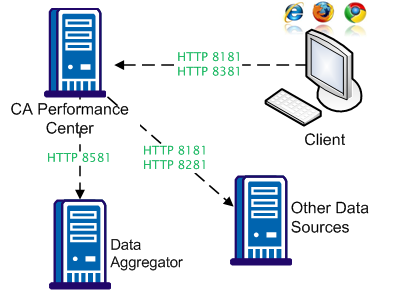

CA Performance Center uses multiple ports to communicate with various components, particularly data sources. In addition, some of the products and components that integrate with CA Performance Center have specific port requirements.
Important! For any firewall that protects this server, open the required ports and protocols for the data sources you are deploying. The product documentation for each data source provides a list of required ports and protocols.
Each data source uses unique ports. However, the following communication ports must be open to allow communications between CA Performance Center and various products or components:
Enables synchronization with CA Network Flow Analysis to retrieve configuration data.
Enables communications from the MySQL database (inbound) on the console.
Enables communications between client computers and the CA Performance Center server. Enables console communications with data sources.
Enables communications between the Event Manager, which is installed automatically with the CA Performance Center software, and the data sources.
Enables communications between client computers and the CA Performance Center server. Also enables login using the Single Sign-On authentication component.
Enables communications between the Device Manager and Console services.
Enables synchronization with CA Network Flow Analysis to retrieve device data.
Enables synchronization with CA Performance Management.
The following diagram illustrates basic port usage:

Be sure to consult the Administrator Guide or Installation Guide of the data sources you install for their port requirements.
|
Copyright © 2015 CA Technologies.
All rights reserved.
|
|